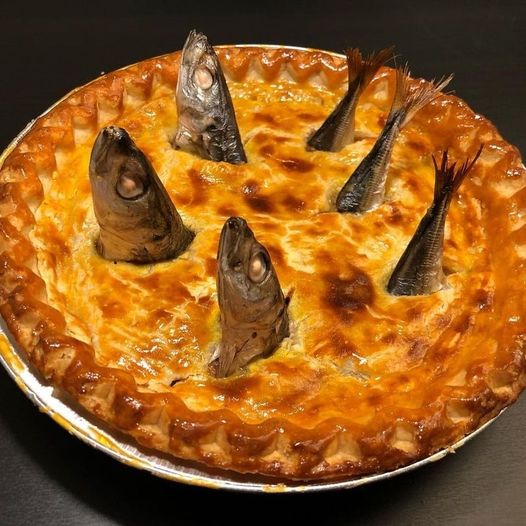Invite him to dinner, Emma, and help him to the best of the fish and the chicken, but leave him to chuse his own wife.
Mr Knightley, Emma chapter one. By the novel’s end, Emma and he were engaged.
Emma was first published on 23 December 1815. It is unlikely that Emma’s suitors would have received stargazy pie, a Cornish concoction of fish, egg and potato where the fish heads protrude from the pastry. It is said that Tom Hawcock braved the sea to get in the fish and take his village of Mousehole out of famine. The village bakes the pie each 23 December, Tom Hawcock’s Eve.
Stargazy pie is usually but not necessarily made of the European pilchard, a fish found in the northeast Atlantic and Mediterranean, as its name Sardina pilchardus suggests. Cornwall is on England’s western shores where the pilchard thrives.
The skate is a different beast altogether, preferring deeper and cooler water. On 23 December Icelanders of the west fjords eat skate after it has been buried and fermented, the day being the feast day of St Thorlak, patron saint of Iceland and of fishermen.
Fish and the run up to Christmas have a long connection. The fish, unlike the chicken, is cold-blooded and often permissible during fasting. Advent – the lead up to the Nativity – is still a time to celebrate by abstention.
A peculiar adaptation is “St Tib’s Eve”. According to a 1936 correspondent of the Connecticut newspaper The Waterbury Democrat:
The expression is Irish and means ‘never’. For example, ‘He will pay you on Tib’s eve’, which means he will pay you not at all. It is derived from St Tib or St Ubes, and as there is no such saint there is no St Tib’s eve.
The Cornish would have had none of this. In 1896, an English historian of dialects recorded:
There is one saint whose name is familiar to all in Cornwall, but whose sex is unknown. This saint has much to answer for; promises made, but never intended to be kept, are all to be fulfilled on next St. Tibb’s eve, a day that some folks say “falls between the old and new year”; others describe it as one that comes “neither before nor after Christmas”.
Newfoundlanders have seen strong immigration from Ireland and from Cornwall. Whoever belongs to the expression, they have merged their folklore and their fasting so that Tibb’s Eve, celebrated on 23 December, is the first chance to have a festive drink. It is also known as Tipsy Eve.
